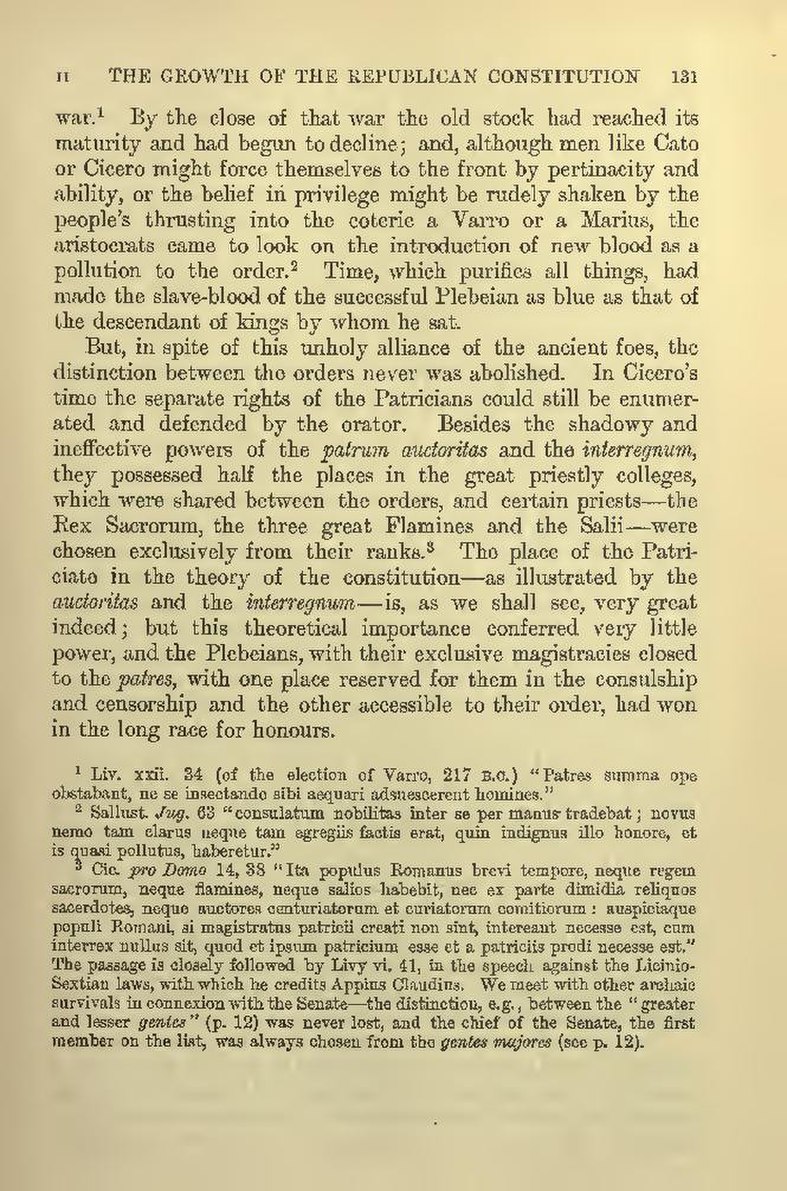war.[1] By the close of that war the old stock had reached its maturity and had begun to decline; and, although men like Cato or Cicero might force themselves to the front by pertinacity and ability, or the belief in privilege might be rudely shaken by the people's thrusting into the coterie a Varro or a Marius, the aristocrats came to look on the introduction of new blood as a pollution to the order.[2] Time, which purifies all things, had made the slave-blood of the successful Plebeian as blue as that of the descendant of kings by whom he sat.
But, in spite of this unholy alliance of the ancient foes, the distinction between the orders never was abolished. In Cicero's time the separate rights of the Patricians could still be enumerated and defended by the orator. Besides the shadowy and ineffective powers of the patrum auctoritas and the interregnum, they possessed half the places in the great priestly colleges, which were shared between the orders, and certain priests—the Rex Sacrorum, the three great Flamines and the Salii—were chosen exclusively from their ranks.[3] The place of the Patriciate in the theory of the constitution—as illustrated by the auctoritas and the interregnum—is, as we shall see, very great indeed; but this theoretical importance conferred very little power, and the Plebeians, with their exclusive magistracies closed to the patres, with one place reserved for them in the consulship and censorship and the other accessible to their order, had won in the long race for honours.
- ↑ Liv. xxii. 34 (of the election of Varro, 217 B.C.) "Patres summa ope obstabant, ne se insectando sibi aequari adsuescerent homines."
- ↑ Sallust. Jug. 63 "consulatum nobilitas inter se per manus tradebat; novus nemo tam clarus neque tam egregiis factis erat, quin indignus illo honore, et is quasi pollutus, haberetur."
- ↑ Cic. pro Domo 14, 38 "Ita populus Romanus brevi tempore, neque regem sacrorum, neque flamines, neque salios habebit, nec ex parte dimidia reliquos sacerdotes, neque auctores centuriatorum et curiatorum comitiorum: auspiciaque populi Romani, si magistratus patricii creati non sint, intereant necesse est, cum interrex nullus sit, quod et ipsum patricium esse et a patriciis prodi necesse est." The passage is closely followed by Livy vi. 41, in the speech against the Licinio-Sextian laws, with which he credits Appius Claudius. We meet with other archaic survivals in connexion with the Senate—the distinction, e.g., between the "greater and lesser gentes" (p. 12) was never lost, and the chief of the Senate, the first member on the list, was always chosen from the gentes majores (see p. 12).
